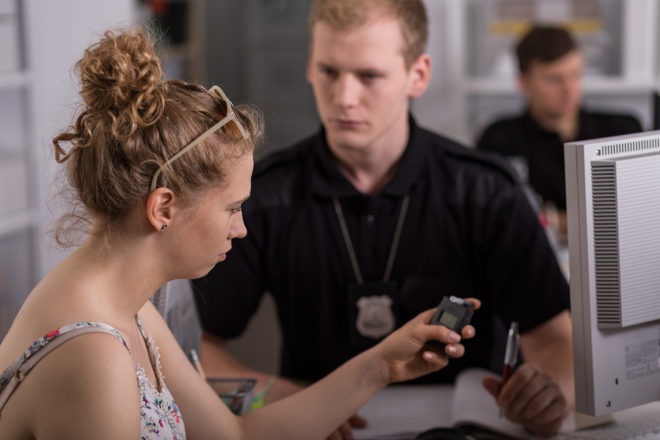

Call Attorney Marni Jo Snyder 24 Hours / 7 Days:
215.515.3360
People who have been arrested for suspicion of a DUI often wonder, what happens next? Many people think that after getting arrested, a trial will happen quickly.
The truth is, the process can sometimes be drawn out over several months.
1. The Arrest
The event that starts the DUI process is the arrest. Being arrested for a DUI can happen anytime, day or night, and it can happen to the driver of a motorcycle, vehicle, or even a boat.
Once an officer suspects the driver is under the influence, the officer will pull the driver over and ask a few questions, then conduct field sobriety tests (such as a “walk and turn” test and others).
If the officer thinks the driver is over the limit, the driver will be placed under arrest and asked to provide a specimen of breath or blood.
2. The Booking Process
Once arrested, the driver is taken to the jail that sits in the city or county where the driver is arrested.
Once there, officers will take the driver’s fingerprints and mugshot, and they will check the driver’s criminal record for any warrants or previous arrests.
They will also search the driver’s personal belongings, such as pockets and purses.
If it is the driver’s first offense, they will usually be released from jail in 12-24 hours, but it can be a little longer depending on how busy the jail may be and other factors.
3. The Arraignment
The arraignment is the driver’s first time to appear in front of a judge or commissioner.
During the arraignment, the driver will be read the complaint and his or her rights, which include the right to a lawyer.
The judge may also ask the driver to enter a plea during the arraignment (e.g., not guilty).
The judge will hear any argument regarding what the amount of bail should be and set bail based on two factors—whether the driver is a flight risk or a danger to the community.
The judge or commissioner will usually do arraignment during the 12-24 detention after arrest.
Usually, the arraignment is done by video conference with the detained person at the police district and the judge at the courthouse or their office.
Other times, the defendant will be given the amount of bail, and the arraignment takes place after a couple of weeks.
The process depends on the place of the arrest and the standard procedure of the court that will be in charge of the defendant’s case.
4. Evidence Collection And Hearings
After the defendant is released from jail, her attorney works with the prosecuting attorney to gather evidence, collect statements, and prepare a defense.
During this time, the defense attorney may attend hearings to discuss the status of the case and talk about possible plea deals with the prosecuting attorney, and they may begin to make a strategy for trial.
This phase of the DUI process can take several months, because evidence is not always available quickly. The defense attorney may need to wait for the prosecuting attorney to deliver the video of the arrest if there was a dash or body camera involved.
They also will have to wait a few months to receive the results from the lab where the driver’s specimen was sent after the arrest.
Also, depending on how busy the court is and how many other cases are waiting for trial, the judge and prosecuting attorney may ask for more time to prepare their cases.
5. Plea Or Trial
After the evidence is collected and the attorney has gathered all the information possible about the arrest, she will work to discuss the options with the defendant.
Sometimes, the case can be thrown out before a trial is necessary. Other times, the defense attorney can get the prosecuting attorney to lower the DUI charge to a lesser offense or tier.
If these options do not happen, then the defendant can decide whether she prefers to take a plea deal or go to trial.
A plea deal is an agreement to plead guilty in exchange for a lesser punishment. It can be beneficial for clients who want to avoid trial or jail time, or for those who have very strong evidence against them.
Occasionally, the prosecutor might agree to a lesser charge if during the whole process described above, the defendant has engaged in treatment.
A trial is a formal court hearing in front of a judge and a jury where evidence is presented by the prosecution against the defendant.
When DUI cases go to trial, the jury decides whether the defendant is guilty or innocent, and the judge determines the punishment.
6. Appeal
Occasionally, a case can be appealed. There are limited situations when an appeal is appropriate for a DUI case.
A direct appeal based on the evidence presented during the first trial.
There is no jury or new evidence during an appeals trial, except in Philadelphia where the first trial may be heard in Municipal Court and the defendant is entitled to a trial de novo in the Court of Common Pleas.
Contact Marni J. Snyder Today
Being arrested for a DUI is stressful. After an arrest, you need a strong, experienced attorney to guide you through the process and defend your rights.
If you have been arrested for a DUI, contact the offices of Marni Jo Snyder today for a free consultation at 215-515-3360.
Call 24/7: 215.515.3360
Email: info@snyderlawyer.com
Fax: 215-376-6981
This website is for general informational purposes only. The act of sending an e-mail to the Firm or any attorney at the Firm, or submitting a form response or other materials through the website, will not create an attorney-client relationship. The only way to create an attorney-client relationship with the Firm is through a written agreement.Read More